Related Research Articles
Human rights in China are periodically reviewed by the United Nations Human Rights Committee (UNHRC), on which the Chinese Communist Party (CCP), government of the People's Republic of China (PRC) and various foreign governments and human rights organizations have often disagreed. CCP and PRC authorities, their supporters, and other proponents claim that existing policies and enforcement measures are sufficient to guard against human rights abuses. However, other countries and their authorities, international non-governmental organizations (NGOs) including Human Rights in China and Amnesty International, and citizens, lawyers, and dissidents inside the country, state that the authorities in mainland China regularly sanction or organize such abuses.
Huang Qi is a Chinese webmaster and human rights activist. He is the co-founder of Tianwang Center for Missing Persons, along with his wife Zeng Li. Initially the mission of the organization was to help counter human trafficking that had become a swelling problem in the late 1990s, but later it was expanded to include campaign against human rights abuse. Huang is also the owner and webmaster of 64tianwang.com, a website originally intended to release news about people who had disappeared in the People's Republic of China.
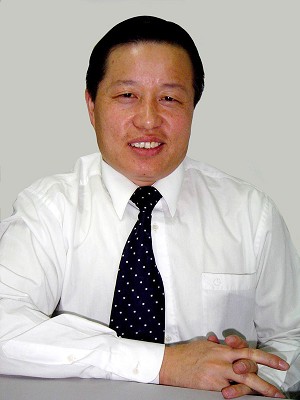
Gao Zhisheng is a Chinese human rights attorney and dissident known for defending activists and religious minorities and documenting human rights abuses in China. Because of his work, Zhisheng has been disbarred and detained by the Chinese government several times, and severely tortured. He last disappeared in February 2009 and was unofficially detained until December 2011, when it was announced that he has now been imprisoned for three years. His commitment to defending his clients is influenced by his Christian beliefs and their tenets on morality and compassion.

Kashgar Prefecture, also known as Kashi Prefecture, is located in southwestern Xinjiang, China, located in the Tarim Basin region. It has an area of 112,057 km2 (43,265 sq mi) and 4,496,377 inhabitants at the 2020 census with a population density of 35.5 inhabitants/km2. The capital of the prefecture is the city of Kashgar which has a population 506,640.
Adel Noori is a Uyghur refugee who was wrongly imprisoned for more than 7 years in the Guantanamo Bay detention camps in Cuba. His Guantanamo Internment Serial Number was 584. Joint Task Force Guantanamo counter-terrorism analysts report that he was born on November 12, 1979, in Xinjiang, China.
Abdullah Abdulqadirakhun is a Uyghur refugee, who was held for more than seven years in Guantanamo Bay detention camps, in Cuba.
Starting in 2002, the American government detained 22 Uyghurs in the Guantanamo Bay detainment camp. The last 3 Uyghur detainees, Yusef Abbas, Hajiakbar Abdulghupur and Saidullah Khali, were released from Guantanamo on December 29, 2013, and later transferred to Slovakia.
Edham Mamet is a Uyghur refugee best known for the more than seven years he spent in the United States Guantanamo Bay detention camps, in Cuba. He was captured in Afghanistan in November 2001. Edham Mamet is one of the 22 Uighurs held in Guantanamo for many years despite the fact that it became clear early on that they were innocent.
The Zirve Publishing House murders, called the missionary massacres by Turkish media, took place on April 18, 2007, in Zirve Publishing House, Malatya, Turkey. Three employees of the Bible publishing house were attacked, tortured, and murdered by five Muslim assailants.
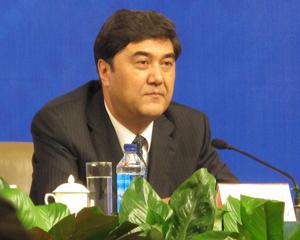
Nur Bekri is a Chinese former politician of Uyghur ethnicity, best known for his term as Chairman of the Xinjiang Uyghur Autonomous Region between 2008 and 2014. Between 2014 and 2018, he was vice-chairman of the National Development and Reform Commission and Director of the National Energy Administration, with rank equivalent of a minister. Bekri was one of the highest ranked ethnic minority officials in the Chinese government.
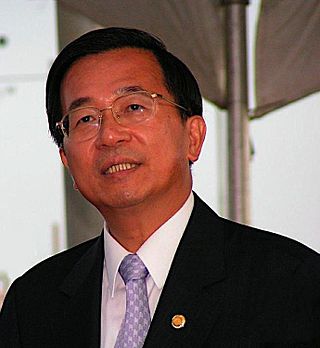
Chen Shui-bian, former President of the Republic of China, stepped down on May 20, 2008, the same day that Ma Ying-jeou took office as the new President of the Republic of China. About an hour after he left the Presidential Office Building, as a former President of the Republic of China and no longer enjoying presidential immunity, he was arrested and restricted from leaving the nation by Taiwanese prosecutors due to allegations of corruption and abuse of authority. Chen was accused of fraud in a case involving the handling of a special presidential fund used to pursue Taiwan's foreign diplomacy. However, the Special Investigation Division dropped money-laundering charges because of a lack of evidence.
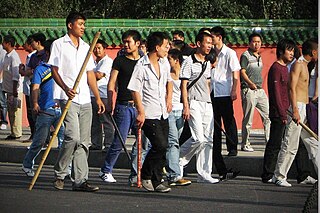
A series of violent riots over several days broke out on 5 July 2009 in Ürümqi, the capital city of the Xinjiang Uyghur Autonomous Region (XUAR), in northwestern China. The first day's rioting, which involved at least 1,000 Uyghurs, began as a protest, but escalated into violent attacks that mainly targeted Han people. According to Chinese state media, a total of 197 people died, most of whom were Han people or non-Muslim minorities, with 1,721 others injured and many vehicles and buildings destroyed. Many Uyghurs disappeared during wide-scale police sweeps in the days following the riots; Human Rights Watch (HRW) documented 43 cases and said figures for real disappearances were likely to be much higher.
The Shaoguan incident was a civil disturbance which took place overnight on 25–26 June 2009 in Guangdong, China. A violent dispute erupted between migrant Uyghurs and Han Chinese workers at a toy factory in Shaoguan as a result of false allegations of the sexual assault of a Han Chinese woman. Groups of Han Chinese set upon Uyghur co-workers, leading to at least two Uyghurs being violently killed by angry Han Chinese men, and some 118 people injured, most of them Uyghurs.

Ilham Tohti is a Uyghur economist serving a life sentence in China, on separatism-related charges. He is a vocal advocate for the implementation of regional autonomy laws in China, was the host of Uyghur Online, a website founded in 2006 that discusses Uyghur issues, and is known for his research on Uyghur-Han relations. Ilham was summoned from his Beijing home and detained shortly after the July 2009 Ürümqi riots by the authorities because of his criticism of the Chinese government's policies toward Uyghurs in Xinjiang. Ilham was released on August 23 after international pressure and condemnation. He was arrested again in January 2014 and imprisoned after a two-day trial. For his work in the face of adversity he was awarded the PEN/Barbara Goldsmith Freedom to Write Award (2014), the Martin Ennals Award (2016), the Václav Havel Human Rights Prize (2019), and the Sakharov Prize (2019). Ilham is viewed as a moderate and believes that Xinjiang should be granted autonomy according to democratic principles.
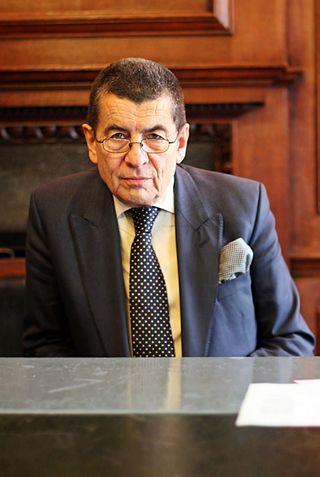
Sir Geoffrey Nice KC is a British barrister and judge. He took part in the International Criminal Tribunal for the Former Yugoslavia and was lead prosecutor at Slobodan Milošević's trial. He is chair of the China Tribunal and the Uyghur Tribunal, which have investigated human rights abuses in China.
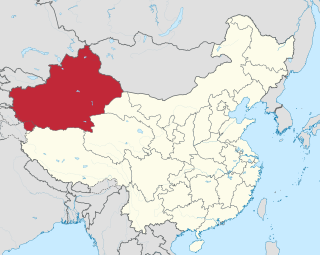
The Xinjiang conflict, also known as the East Turkistan conflict, Uyghur–Chinese conflict or Sino-East Turkistan conflict, is an ongoing ethnic geopolitical conflict in what is now China's far-northwest autonomous region of Xinjiang, also known as East Turkistan. It is centred around the Uyghurs, a Turkic ethnic group who constitute a plurality of the region's population.

The Xinjiang internment camps, officially called vocational education and training centers by the government of China, are internment camps operated by the government of Xinjiang and the Chinese Communist Party Provincial Standing Committee. Human Rights Watch says that they have been used to indoctrinate Uyghurs and other Muslims since 2017 as part of a "people's war on terror", a policy announced in 2014. The camps have been criticized by the governments of many countries and human rights organizations for alleged human rights abuses, including mistreatment, rape, and torture, with some of them alleging genocide. Some 40 countries around the world have called on China to respect the human rights of the Uyghur community, including countries such as Canada, Germany, Turkey, Honduras and Japan. The governments of more than 35 countries have expressed support for China's government. Xinjiang internment camps have been described as "the most extreme example of China's inhumane policies against Uighurs".

The Chinese government has committed a series of ongoing human rights abuses against Uyghurs and other ethnic and religious minorities in Xinjiang that is often characterized as genocide. Beginning in 2014, the Chinese government, under the administration of Chinese Communist Party (CCP) General Secretary Xi Jinping, incarcerated more than an estimated one million Turkic Muslims without any legal process in internment camps. Operations from 2016 to 2021 were led by Xinjiang CCP Secretary Chen Quanguo. It is the largest-scale detention of ethnic and religious minorities since World War II. The Chinese government began to wind down the camps in 2019. Amnesty International states that detainees have been increasingly transferred to the formal penal system.
Merdan Ghappar is a Chinese model and a prisoner of Uyghur heritage. He became known for his internment in one of China's Xinjiang re-education camps in 2020. Merdan achieved to smuggle video footage and text messages from his internment camp to family members in Europe, who then passed the material on to the press. As of 5 August 2020, his status was unknown.
Rahile Dawut is an Uyghur ethnographer known for her expertise in Uyghur folklore and traditions. Formerly a professor at Xinjiang University, where she founded the Minorities Folklore Research Centre, she was disappeared by the Chinese government in 2017 and has not been seen since. In 2023, Rahile received a life sentence for "endangering state security".
References
- ↑ "Profile of Alimujiang Yimiti" (PDF). ChinaAid . Retrieved 2010-05-26.
- ↑ "China Christian Facing Execution After Tibet Protests, Family Says". BosNewsLife. 2008-04-09. Retrieved 2010-05-26.
- ↑ Bos, Stefan J. (2007-10-07). "China Expels Dozens of Foreign Missionaries, Closes Down Christian Companies". BosNewsLife. Worthy Christian News . Retrieved 2010-05-26.
- ↑ "Campaigners Call for Release of Prisoners of Conscience". Christian Solidarity Worldwide. Independent Catholic News. 2009-06-04. Retrieved 2010-05-26.
- ↑ Ireland, Michael (2009-07-27). "Trial Date set for Imprisoned Christian Alimujiang Yimiti". ASSIST News Service. Archived from the original on 2011-07-21. Retrieved 2010-05-26.
- ↑ "Uyghur Church Leader Sentenced to 15 Years Criminal Detention". Pakistan Christian TV. 2009-12-08. Retrieved 2010-05-26.
- ↑ Bos, Stefan J. (2009-04-02). "China Jailed House Church Leader Hospitalized; Christian Lawyer Remains Missing". Worthy Christian News. Retrieved 2010-05-26.
- ↑ "Uyghur Christian sentenced to fifteen years in prison". Christianity Today. 2009-12-10. Retrieved 2010-05-26.
- ↑ "Alimjan", Campaign, ODUK